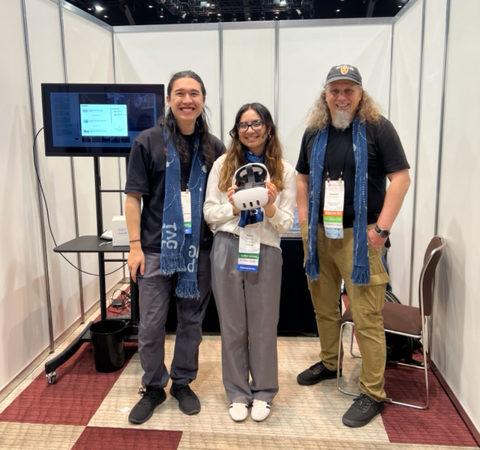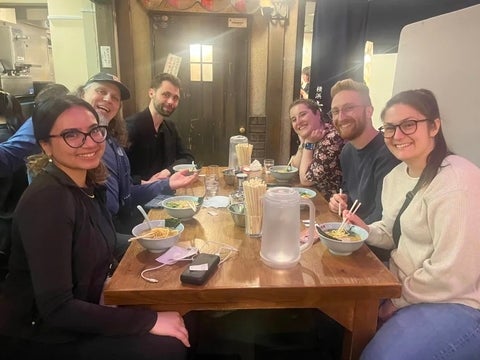Time Travel Tours: A SYDE undergraduate student’s quest to make virtual reality more accessible for older adults
Aava Sapkota, a third-year Systems Design Engineering (SYDE) student, is making virtual reality (VR) technology accessible for older adults as a research assistant in Dr. Cosmin Munteanu’s lab. Aava shares her inspiration and the project that culminated in a research paper and system demonstration at an international conference on Human Computer Interaction in Yokohama, Japan.
What interested you in making virtual reality more accessible for older adults?
I’m interested in helping older adults access any technology more independently — not just as therapy, but to genuinely feel empowered in digital spaces.
VR, especially Social VR, offers deeply embodied experiences that are great for people who can't easily travel. But these tools are often seen as intimidating or irrelevant for older adults. I want to fight that stigma by building tech that makes sense for where they are in life.
The idea came when I was in high school and had to miss out on a trip with my siblings to visit our great-grandmother in Nepal. Video calls never felt like enough, and I wished for something more immersive. That desire to connect across distance really deepened during COVID-19, especially for older adults who were often left out of the digital shift. This project is a small way of addressing that gap.
How did you develop the idea?
It started with me being curious and pitching ideas to my mentor, Sho Conte. We’d talk through concepts and figure out how to implement them, break off into our own exploratory sessions and come back together. The process was wonderfully collaborative!

Sho, Aava, and Dr. Munteanu at the HCI conference in Japan.
Can you describe your solution?
Time Travel Tours is a web application that empowers older adults to create their own VR tours of meaningful locations and share them on a social VR platform called Spatial.
The tool uses a chatbot (powered by Claude) to help participants talk through memories and identify key places in their stories. It then pulls geo-spatial data from the conversation, finds matching Google Street View images, and generates a tour lineup they can edit. Once finished, it’s automatically turned into a Unity project and published to Spatial, where it can be shared with friends and family and experienced together — in VR or on a phone or laptop.
You published your research in the paper, "Time Travel Tours: An Accessible Social VR Storytelling Tool for Older Adults". What was it like leading a research paper and presenting at a major conference as an undergraduate student?
It was incredibly fulfilling! The conference in Japan was like a very fancy science fair. It was mostly one-on-one demos, which helped with nerves, and it was so energizing to meet brilliant researchers from around the world. It gave me a lot more confidence in my work and ideas — I even had conversations about future collaborations!
What’s one key thing you learned from this project?
I’ve started to challenge the idea that older adults only use technology for therapy or medical tracking. There’s so much potential in recreational tech — not just as a stand-in for real life, but as a meaningful experience in its own right.
Technically, I learned how to dive into new systems and build end-to-end pipelines from scratch. But maybe more importantly, I learned how to trust my ideas and stay curious.

Dr. Munteanu with his research team in Japan.
Was there a breakthrough moment?
During a conversation with Tom, one of our senior advisors, he described the project as a kind of digital photo album. That framing really clicked. It helped me better explain the concept to people unfamiliar with VR and gave me direction for where to take it next.
How has this experience influenced your future goals?
Before this, I was set on going straight into industry after graduation. Now, I'm seriously considering grad school.
This project taught me how fulfilling it is to explore big ideas — and to fail, iterate, and keep going. I’ll still go into industry first to gain some context and experience, but I know I’ll come back to research when the right question finds me.